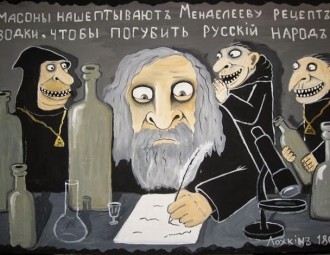Uladzimir Matskevich: Belarus can be viewed as an experimental ground for FSS

All kinds of movements were tried out at the Belarusan territory, which after successful tests were taken over by Russia.
On March 26 at the session of FSS Vladimir Putin announced the “disclosure” of anti-Russian conspiracy prepared by the West. According to his data, “actions for the forthcoming election campaigns of 2016 and 2018 are being organized”. The main conspirators, according to the Russian president, are Russian NGOs. “Western intelligent services don’t stop their attempts to use public non-government organizations and politicized unions in their own purposes, first of all, to discredit the authorities and destabilize inner situation in Russia”, - claimed Putin. And that is why Russia will be suppressing actions of “those, who work by external request, in the interest of foreign country or countries”.
This rhetoric isn’t new for Belarus – we went through this in the mid 90s.
What is hidden behind the search for external and internal enemies of Russia? Uladzimir Matskevich, the head of the Board of the International Consortium “EuroBelarus “, answers the questions of “EuroBelarus” Information Service.
- Putin blamed the West in “destabilization of internal situation in Russia” and is using public non-governmental organizations for that purpose. What is hidden behind these accusations? Is it an attempt to consolidate pro-Putin majority in the face of danger of “internal and external enemy”?
- The rhetoric is not new. All dictatorships earlier or later come to the need to assign a new enemy. Gradually, with accumulation of internal problems, the number of internal and external enemies is increasing, so that the country is found “in the collar of enemies”. In this case the state can turn the screws and suppress any discontent.
This is well-trodden tactics of dictators.
Problems inside Russia started with the Russia-Ukraine war. Before the war Russian NGOs came to be registered as foreign agents. These were univocal attempts to distract society from inner-Russian problems.
Russia had to displace its hostilities in Donbas, which is non-success of the military operation. This non-success of special operation in Ukraine will lead to the situation when Russian society will recollect inner problems.
Search for enemies, forecasts of conspiracies and provocations distracts the attention of the society from the problems that the Putin’s regime has lead Russia to.
- Kremlin is going to take under control foreign sources of NGO’s funding and compare their authorized goals with their practical work. Has the competition for turning the screws started?
- Assault on civil society organizations started few years ago, and mainly affected human rights organizations aimed at civic freedoms and at participation in public campaigns. These organizations were declared “foreign agents”. They were made to register as “foreign agents”. It is very hard to find the reason to close a civil society organization; that is why Kremlin made such move.
Similar actions Aliaksandr Lukashenka made in 1996-1997, when reregistration of NGOs was announced, Soros Foundation that was mainly funding humanitarian sciences was expelled from the country since it presented threat for Lukashenka. Putin is repeating Lukashenka’s move after more than a decade.
After the start of the Russia-Ukraine war the West was having difficulties with getting used to Russia in the role of an aggressor. Since dissolution of the Soviet Union Western countries looked upon Russia as a country in the transformation process. The West invested big money in Russia – funding of the country’s modernization largely exceeded the help of the West to NGOs. It is ridiculous to say that Western money went for Russia’s disruption through NGO’s, as the volume of funding is incommensurable.
Sadly though traditionally for Russia, the money for modernization were plundered, so Russia didn’t reach any particular economic successes; certain successes happened, but they are only related to the rent of minerals.
That is why Kremlin’s regime has to think of not only external, but also internal enemies. Russia is restoring Stalin’s internal and foreign policy.
- Lukashenka burnt out Belarusan inner political space with similar methods 10 years ago. Is Putin trying to provide itself with its own political longevity with Lukashenka’s methods?
- We need to dig into the history of Belarus-Russia relations.
No matter how perverted Lukashenka and his ideological and administrative apparatus are, Lukashenka has always acted and conducted his own policy according to scenarios of Russian intelligent services and FSS. And in 1994 Lukashenka won only with colossal support of Russia’s political and economic support and managed to escape impeachment in 1996 only with direct Russia’s involvement. We can say that Lukashenka’s regime survives only thanks to Kremlin’s economic and political support, adjusting and conducting its policy with the FSS.
Different kinds of movements – political, economic, ideological, were tried out at the Belarusan experimental area, and if proved to be successful, Russia adopted these movements from Belarus. Belarus can be viewed as an experimental ground for FSS, which is the main Kremlin’s brain centre. Indeed, first these methods were tried out at the Belarusan territory, which after successful “tests” were taken over by Russia.
-
03.01
-
07.10
-
22.09
-
17.08
-
12.08
-
30.09








































